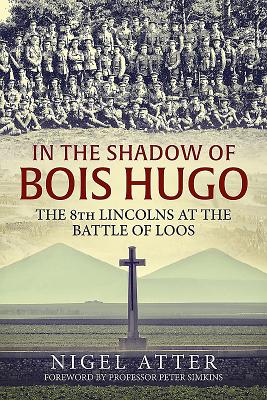In the Shadow of Bois Hugo: The 8th Lincolns at the Battle of Loos

In the Shadow of Bois Hugo: The 8th Lincolns at the Battle of Loos
This is the first book dedicated to the subject of the 8th (Service) Battalion, Lincolnshire Regiment during the First World War - and this particular Kitchener battalion has been a neglected topic of study; however, there is a rich mine of information to be found - including the methods of recruitment; the initial training (or lack of it); the lack and late arrival of equipment; and the actual fighting experience of the 8th Lincolns at Loos. Importantly, this volume challenges the well-established British historiography about the general reserves and their performance at Loos, with the author arguing that the reserves, rather than being routed, stood, fought and died at Loos in 1915. Following extensive archival research, the author has also built up a picture of the officers, which range from the very young junior second lieutenants straight out of university - the Officer Training Corps (OTC) - to a man who had seen 25 years' army service, but had never experienced a shot fired in anger until Loos. The men who constituted the ordinary soldiers were commonly the 'salt of the earth' - drawn from the ranks of the industrial and agricultural laboring classes. There is no great captain amongst them, but their grit and determination to the bitter end is an example of soldierly conduct in the best traditions of the British Army. British historiography hasn't been kind to the reserves who fought at Loos - claiming, at worst: 'They bolted!' and, at best, they were tired out by a forced march... hungry and wet through. The reality is at least one company stood and fought until almost completely out of ammunition, with all their officers dead or seriously wounded; surrounded by Germans with machine guns, the surviving Lincolns were captured. The experience of the 8th Lincolns is placed in the wider context, with the British Expeditionary Force's (BEF) learning process during 1915 and the aftermath of the accusations which led to the dismissal of Sir John French as Commander-in-Chief of the BEF and Sir Douglas Haig's appointment as the Chief. This book will appeal on a number of levels: it documents the life of an otherwise hitherto unknown Kitchener battalion; it challenges orthodox historiography; and it firmly shows that rather than running away, the 8th Lincolns (and, more generally, the reserves) behaved, by and large, with courage and resolution.
PRP: 143.64 Lei
Acesta este Pretul Recomandat de Producator. Pretul de vanzare al produsului este afisat mai jos.
129.28Lei
129.28Lei
143.64 LeiLivrare in 2-4 saptamani
Descrierea produsului
This is the first book dedicated to the subject of the 8th (Service) Battalion, Lincolnshire Regiment during the First World War - and this particular Kitchener battalion has been a neglected topic of study; however, there is a rich mine of information to be found - including the methods of recruitment; the initial training (or lack of it); the lack and late arrival of equipment; and the actual fighting experience of the 8th Lincolns at Loos. Importantly, this volume challenges the well-established British historiography about the general reserves and their performance at Loos, with the author arguing that the reserves, rather than being routed, stood, fought and died at Loos in 1915. Following extensive archival research, the author has also built up a picture of the officers, which range from the very young junior second lieutenants straight out of university - the Officer Training Corps (OTC) - to a man who had seen 25 years' army service, but had never experienced a shot fired in anger until Loos. The men who constituted the ordinary soldiers were commonly the 'salt of the earth' - drawn from the ranks of the industrial and agricultural laboring classes. There is no great captain amongst them, but their grit and determination to the bitter end is an example of soldierly conduct in the best traditions of the British Army. British historiography hasn't been kind to the reserves who fought at Loos - claiming, at worst: 'They bolted!' and, at best, they were tired out by a forced march... hungry and wet through. The reality is at least one company stood and fought until almost completely out of ammunition, with all their officers dead or seriously wounded; surrounded by Germans with machine guns, the surviving Lincolns were captured. The experience of the 8th Lincolns is placed in the wider context, with the British Expeditionary Force's (BEF) learning process during 1915 and the aftermath of the accusations which led to the dismissal of Sir John French as Commander-in-Chief of the BEF and Sir Douglas Haig's appointment as the Chief. This book will appeal on a number of levels: it documents the life of an otherwise hitherto unknown Kitchener battalion; it challenges orthodox historiography; and it firmly shows that rather than running away, the 8th Lincolns (and, more generally, the reserves) behaved, by and large, with courage and resolution.
Detaliile produsului









